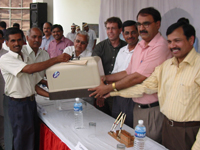You are here
Endowment for Global Health Priorities
 In the Fall of 1999, a group of CDC employees and retirees who understood the challenges of doing public health work in developing countries decided to create an endowment fund to address global health issues. The fund would provide a source of flexible funding to meet critical or emergency needs in the field that could not easily be met through usual government channels. Thanks to the vision and generosity of those CDC employees and matching support from the Marcus Foundation, the fund has grown to over $250,000 and more than $24,000 has been disbursed to fund program initiatives. The Fund helps CDC address polio, vaccine-preventable diseases and other priority global health issues.
In the Fall of 1999, a group of CDC employees and retirees who understood the challenges of doing public health work in developing countries decided to create an endowment fund to address global health issues. The fund would provide a source of flexible funding to meet critical or emergency needs in the field that could not easily be met through usual government channels. Thanks to the vision and generosity of those CDC employees and matching support from the Marcus Foundation, the fund has grown to over $250,000 and more than $24,000 has been disbursed to fund program initiatives. The Fund helps CDC address polio, vaccine-preventable diseases and other priority global health issues.
In the words of Bob Keegan, former deputy director pf CDC's Global Immunization Division, "This endowment allows us to focus on the real issues in the field while rapidly resolving critical, frequently inexpensive operational problems that so often interrupt our work. When civil unrest in Somalia intensified during 2002, our staff requested that we provide bulletproof vests for several national health workers most at risk. The CDC Foundation approved funding immediately, allowing work to continue without interruption, and further enhancing CDC's reputation as an agency that does what it takes to get the job done."
Fund Provides Sewing Machines to Fight Polio in India

”Vaccinators and supervisors had conducted numerous immunization campaigns and fatigue was a real risk,” says CDC public health advisor Julie Jenks. “So we decided to try to generate some excitement about the campaign in the community and among our vaccination teams.”
Two “outstanding” supervisors in each of Moradabad’s 22 planning areas received wrist watches provided by Rotary International, and a total of 66 outstanding vaccinators received sewing machines. The sewing machines were purchased through the CDC Foundation’s Endowment for Global Health Priorities.
“Local vaccinators and supervisors receive only a small per diem of about $1 per day,” says Jenks. “The incentives really energized them to vaccinate every child.”
In addition, families in which all children were immunized were entered into a “lucky drawing” to receive a sewing machine. The 132 winning families were recognized at a ceremony at the conclusion of the campaign. More than 500 people attended the ceremony which received significant local media coverage.
“This small expenditure made possible through the CDC Foundation made a big difference in the success of this campaign,” says Jenks. “We hope to learn from this pilot project and selectively use incentives in difficult areas.”
- Multiple individuals and organizations
- CDC’s Global Health Center
- India
- Somalia